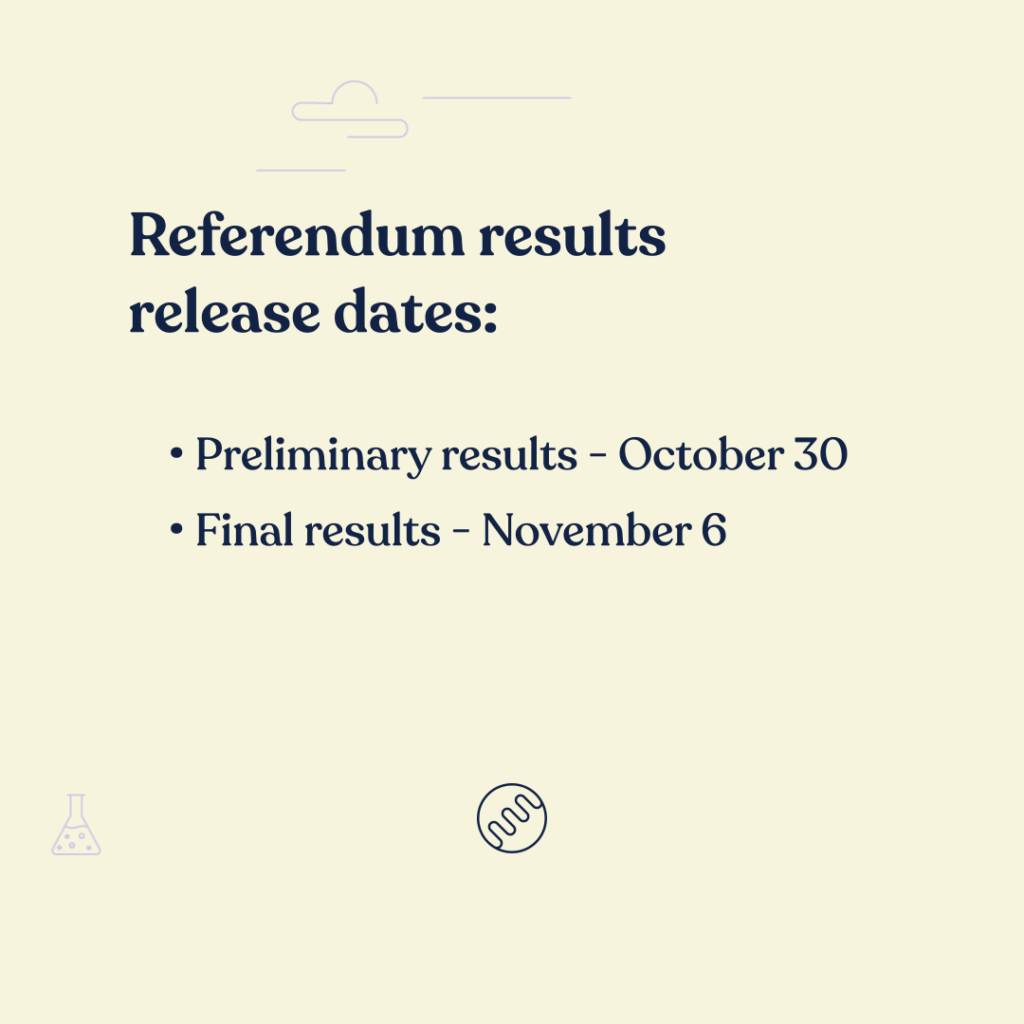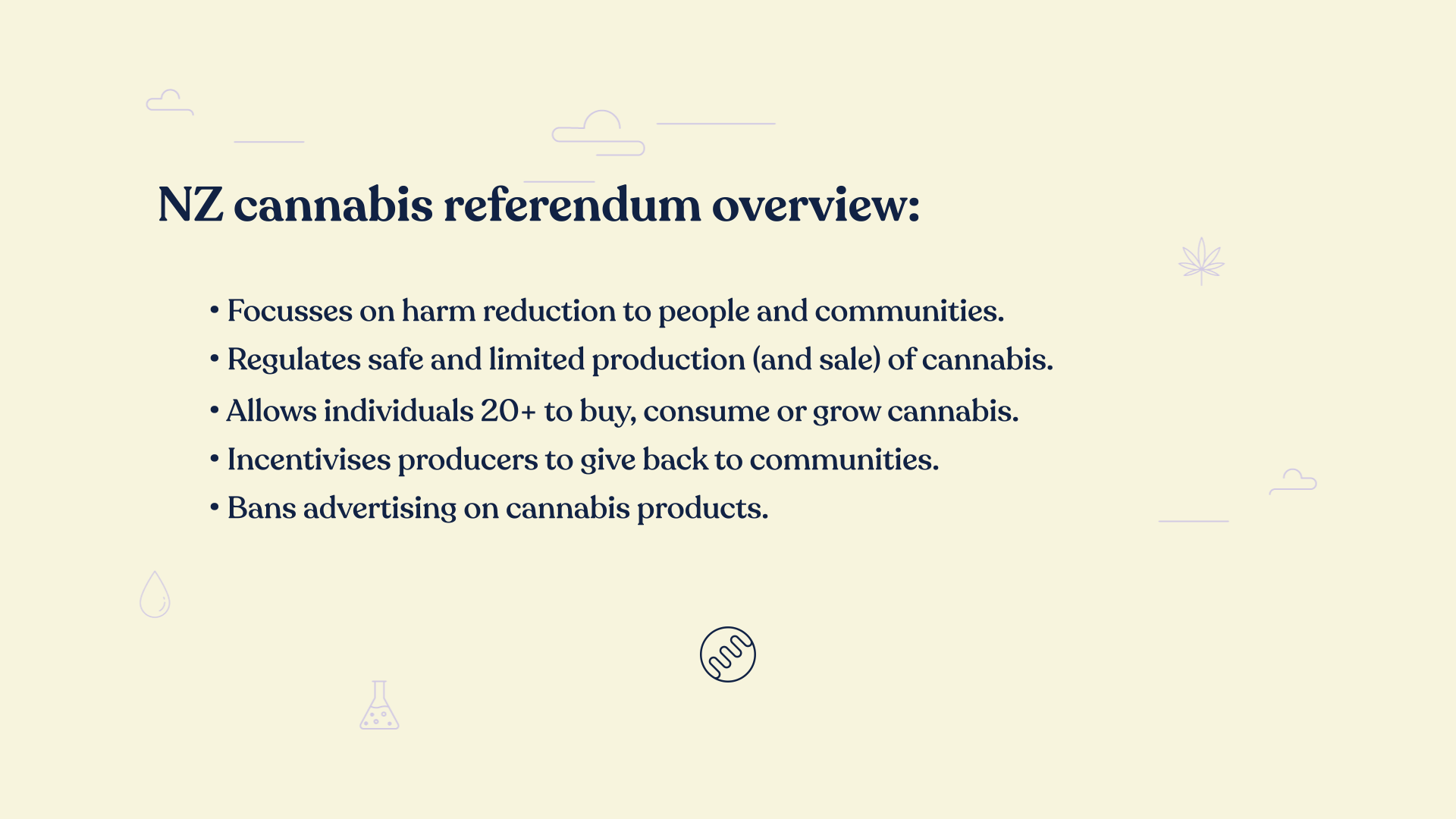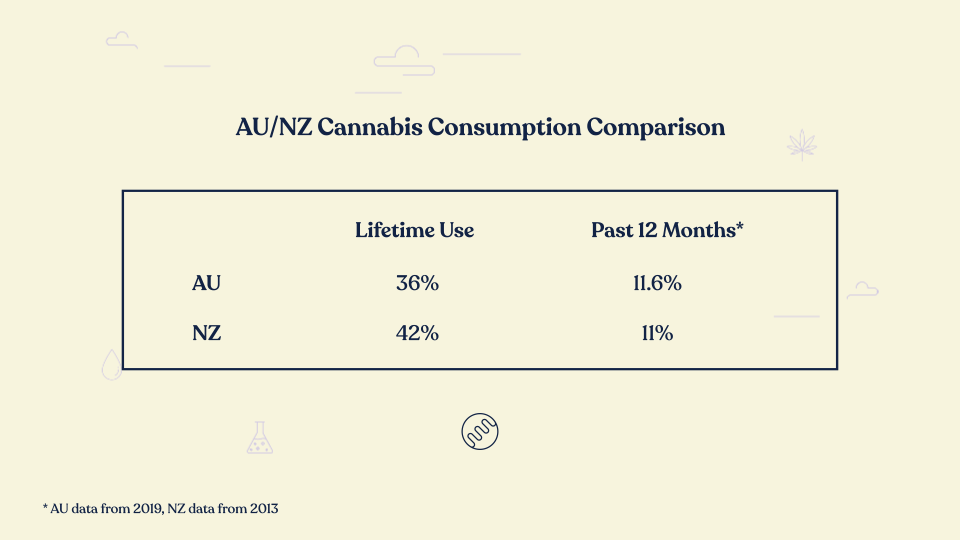2020 has been a progressive year for cannabis in Australia and New Zealand. Australia is making slow but steady headway on medical cannabis and driving law discrimination, and may see CBD available over the counter at pharmacies in the next 18 months. Across the Tasman, NZ voted on a referendum to legalise cannabis nationwide.
Many people are eager to understand what (if any) impacts the NZ referendum decision will have on Australia. In this article, Rhys Cohen and I compare the Australian and New Zealand markets and discuss the impacts of the NZ referendum on Australia. The wonderful thing about the referendum is whether it passes or not, the proposal itself will live in cannabis history and it will influence the perception, education and awareness of cannabis across NZ and Australia.
Cannabis has become a part of everyday life for many Aussies and Kiwis. Rhys pointed out this very important fact in saying, “It’s not an argument or a question about whether you’re for or against cannabis. It’s about, do you want it to be run and controlled by organised crime gangs? Or, do you want it to be run and controlled by the government with the primary interest of protecting public health?”
Here are the topics discussed in case you’d like to jump ahead:
- 00:43 | Is cannabis prohibition really working?
- 02:09 | How has legalisation overseas impacted those places?
- 03:36 | An overview of the NZ cannabis legalisation proposal.
- 05:20 | What makes the NZ proposal stand out?
- 07:52 | What are some of the public health aspects of the proposal?
- 09:35 | What were some of the highlights of the campaign leading into the vote?
- 12:22 | Comparison of the AU and NZ markets.
- 13:30 | Learnings for Australia from the referendum.
- 15:48 | Next steps for cannabis and down-regulation of cannabis in Australia.
- 18:10 | Impacts of the referendum on Australia.
- 20:15 | Impacts of overseas policies on Australia.

Is cannabis prohibition really working?
While many people believe that prohibition isn’t working, it’s a difficult question to answer with data because, in Australia, we don’t have anything else to compare it to.
It’s just taken as the status quo. But, some of the objectives of prohibition are to reduce cannabis-related harms, to reduce problematic consumption of cannabis and to reduce consumption of cannabis in general. It appears to be failing and it appears to have always been failing.
Research shows that 11% of Australians have consumed cannabis in the last 12 months and over half of Australians have consumed cannabis at least once in their lifetime. These numbers have remained steady for many years despite efforts to interdict cannabis shipments and to eradicate cannabis supply chains.
It’s a very popular drug and loads of people continue to use it every day. So, I don’t think you could argue that prohibition has been a success.
How has legalisation overseas impacted those places?
Cannabis is currently legal recreationally in Canada, Uruguay and in 11 States in the USA. These changes have all occurred in the last 10 years which seems to be a sign of a change in perception of cannabis.
What we’ve seen in places like the US is that when one state legalises medical or adult-use cannabis, it increases the likelihood that a neighbouring State (or States) with similar political and social compositions begins to pursue medical or recreational legalisation.
They also provide examples of how the sky doesn’t fall when recreational cannabis programs are implemented.
Movements in other countries provide templates in terms of how regulation and legislation may work. These changes also give people a bit more competence and confidence in experimenting with different policy options.
An overview of the NZ cannabis legalisation proposal.

The NZ Cannabis Referendum proposal is to legalise the cultivation and manufacture of cannabis products for recreational purposes and would not impact the medical cannabis framework. The main features of the proposal are:
- Legalising the creation and production of cannabis products.
- Limited storefronts without any advertising.
- 14g of cannabis purchase limit (daily).
- Personal cultivation of 2 plants per person or 4 per household
- Setup of cannabis premises (cannabis lounges)
The proposal does not allow for advertising, and venues that sell cannabis are not allowed to serve or sell alcohol. There are also limits on potency and many other restrictions to help produce fewer harms from recreational consumption of cannabis.
What makes the NZ proposal stand out?
It’s the framework that I think best balances solving the problem of protecting public health and does it in a way that’s socially and politically acceptable.
The current problem is that adult-use cannabis is owned and controlled by criminal organisations that sell whatever they want to whomever they want without restriction, taxes or oversight. One way to solve this problem is by legalising everything and allowing cannabis to be sold to anyone and to allow for advertising, like some places in the USA.
Rhys said he’s against that method because not only is legalising cannabis alongside advertising not palatable politically, he also doesn’t believe cannabis (or other drugs) need to be advertised.
The other outstanding element to the policy is the government cap on market share. The government will set a production limit each year. The proposal mandates that no one producer can own more than 20% of the product at any given time. This requirement avoids any concerns with large corporations having too much influence on the market, government or regulators.
What are some of the public health aspects of the proposal?
The objective [of the bill] is to reduce harm in the community and improve public health. Public health is the single most important objective of the bill, which is as it should be.
The bill includes an excise tax on cannabis products. A percentage of the tax is dedicated to harm reduction and community education. As mentioned above, there is a cannabis production cap. Companies will apply to have a share of the total production each year.
The criteria by which companies are allocated market share are based on not only whether they are fit and proper, but most importantly by the extent to which they are giving back to communities that are harmed by the war on drugs. This can include employing locals or helping to create community programs or other things.
The framework is set up so that the most successful companies will always be the companies that are producing the most social good as opposed to the companies that are generating the greatest profits.
What were some of the highlights of the campaign leading into the vote?
Research leading into the campaign showed that individuals who were educated on the proposal and the public health focus were more likely to vote yes. But, there were strong campaigns from both the yes and no camps.
It was interesting when it came to light that many of the anti-legalisation groups that had been campaigning against the referendum were found to have very close links with prohibitionist organisations from overseas.
The anti-cannabis campaigns were well known for lying and mis-characterising other people’s arguments. This international interference simply highlights how international prohibitionist organisations can astroturf campaigns in other countries.
The other classic moment leading up to the vote was when the NZ Medical Association (NZMA) had to revise their position from being against the referendum to neutral. Initially, the NZMA took a strong stance against a yes vote. They received massive backlash from their members saying that members’ opinions hadn’t been taken into account.
That was quite interesting because it shows that medical practitioners and people who care about public health are actually paying attention. They expect the organisations that represent them to actually represent what they believe.
Comparison of the AU and NZ market.

The cannabis consumer market of both Australia and New Zealand are quite similar. While the only data we could find on NZ is dated, the numbers in Australia have remained relatively stable for the past decade and so we’ve made an assumption that NZ has been similar.
An interesting fact about the Kiwi consumer population is that a study shows that 80% of people born in the 1970s had consumed cannabis at least once in their life.
A major difference between Australia and New Zealand’s illicit cannabis market is ‘tinny houses’. Tinny houses are houses where individuals can buy their cannabis (and other drugs) illegally as if they were at a corner store. The government estimated that there were about 684 across the country.
Learnings for Australia from the referendum.
The New Zealand model is so beautiful in the way in which it manages to balance these competing objectives and to do it in such a way that is politically and socially acceptable.
This proposal shows that there’s such a wide spectrum of policy options for regulating these products. The proposal proves that it can be done in a way that genuinely protects public health and avoids some of the worst aspects of other cannabis markets.
Here are 4 key takeaways from the proposal:
- Australian cannabis law reform must be politically and socially acceptable.
- Australian cannabis law reform must protect public health.
- Public education about cannabis will be key to changing perception and laws.
- We’ll need a well-developed policy and framework from the government. And, education must start as early as possible.
Next steps for the down-regulation of cannabis in Australia
When speaking with Rhys, I mentioned the economic argument for down-regulation of cannabis. While that argument may be part of the equation, Rhys’s focus is on public health.
A lot of people put a lot of stake in the economic arguments for legalisation. Many people think that legalising cannabis will create jobs and growth and capture tax revenue. I would argue that what people probably care about most is improving public health outcomes.
So, the next step in Australia’s regulation is likely going to be decriminalisation. We’d hope to see the reduction of criminal penalties for personal and maybe even removing criminal penalties for personal use. After those steps, perhaps we’ll see legalisation.
Rhys also pointed out that the medical cannabis framework’s evolution could have an impact on decriminalisation or legalisation.
When we started off in 2016 it was very obvious that anyone who got medical cannabis was a legitimate patient because it was so difficult, so expensive, a big risk, and took so much effort.
Rhys felt that there might be a point where medical cannabis is quick, easy, and affordable which might blur the lines of medical and non-medical consumption. The challenges with a normalised system are that it could de-legitimise the medical benefits of cannabis. But, he also pointed out that it could be beneficial because it would bring the normalisation of cannabis to the forefront.
Impacts of the referendum on Australia
Regardless of the outcome of the referendum, there will be an immediate requirement for political parties in Australia to take another look at their recreational cannabis policies. Down-regulation has been on the minds and in the media for quite some time now. The Greens have had legalisation of cannabis as part of their policy for many years. And, there are members of the Labour party taking a softer stance towards decriminalisation.
We’ll probably end up seeing what we see in other countries. That is, a weird coalition of right-wing libertarians and left-wing social justice, public health advocates band together around the issue.
If the referendum passes, we’ll probably also see a significant amount of cannabis tourism that New Zealand will attract both from Australia and around the world.
Also important to note is that PM Jacinda Ardern was interviewed about the cannabis referendum after her win (but before the referendum results were announced). She was asked what will happen if the vote is a no. Her response focussed on the fact that many of the public health issues around cannabis in NZ still needed to be addressed. So, we can hazard a guess that even if the bill fails, we’ll see some cannabis law reform in NZ.
Impacts of overseas policies on Australia
What happens overseas always has an impact on Australia, the question is just how much of an impact. Our politicians and regulators do look overseas for examples of what can be done, and what not to do.
I think the New Zealand proposed bill will be historically important. It’s a very early stage recreational cannabis bill. It’s one of the few thoroughly designed recreational cannabis programs at the federal level in the world. People will be looking at this bill for years and years to come.
Cannabis reform is happening worldwide and will continue at a rapid pace whether it be medicinal, adult-use or otherwise. In the US, Joe Biden and Kamal Harris have committed to decriminalising cannabis at a federal level. In New Zealand we’re expecting cannabis drug reform, at a minimum.
Whether the referendum outcome is a yes or a no, and with medical cannabis in Australia patient approval figures growing month on month, our cannabis future is looking bright, even if it’s a slow burn.



